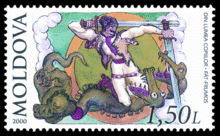Făt-Frumos

Făt-Frumos (from Romanian făt: son, infant; frumos: beautiful) is a knight hero in Romanian folklore, usually present in fairy tales.
Akin to Prince Charming, he possesses such essential attributes as courage, purity, justness, physical and spiritual strength, cleverness, passion, and unshakable love. Făt-Frumos also displays some minimal abilities in performing miracles, as well as total commitment to the word given and to the monarch he serves. In some tales, he is so precocious as to be able to weep before he is born.[1]
Făt-Frumos is usually the youngest son of a king. In the Romanian folk stories it is common that all the sons of a king try to defeat the Zmeu or the Balaur, the older sons failing before the younger one succeeds.
Făt-Frumos has to go through tests and obstacles that surpass ordinary men's power. With dignity, he always brings these to a positive resolution. He fights demonic monsters and malevolent characters (zmeu, balaur, Muma Pădurii, etc.). He travels in both "this land" and "the other land" (tarâmul celălalt) on the Calul Năzdrăvan ("The Marvellous Horse"), who also serves as his counsellor.
In his journeys, Făt-Frumos often has to overcome a major dilemma related to the correct route he is to follow, and is bound to decide between two equally nonsensical choices. Asked about the right way, an old woman gives Făt-Frumos an obscure answer: "If you turn right, you will be in sorrow; if you turn left, you will be in sorrow as well". (Compare to Russian fairy tales, where in Tsarevitch Ivan, the Fire Bird and the Gray Wolf and The Bold Knight, the Apples of Youth, and the Water of Life, where the hero is also offered a choice, but though all the paths have unpleasant aspects, they are distinguishable.)
According to Victor Kernbach, this lose-lose situation evokes the historical condition of the Romanian people whose homeland had been constantly crossed and attacked by foreign powers, as the native population was always forced to decide between two equally unfortunate choices: ally with your enemies or fight them.
Făt-Frumos is also a commonplace figure of the Romanian culture and literature. He appears as a character in stories and poems by famous writers, such as Mihai Eminescu, Tudor Arghezi, or Nichita Stănescu. As a symptom of the Romanian people’s self-irony, Făt-Frumos can be encountered even in contemporary Romanian jokes, yet less frequently than Bulă or the political personalities of the moment.
References
- ↑ Julia Collier Harris, Rea Ipcar, The Foundling Prince & Other Tales: Translated from the Roumanian of Petre Ispirescu, p xii, Houghton Mifflin Company, Boston and New York 1917
- (Romanian) Kernbach, Victor (1989). Dicţionar de mitologie generală. Editura Ştiinţifică şi Enciclopedică, Bucureşti, pp. 183–184.